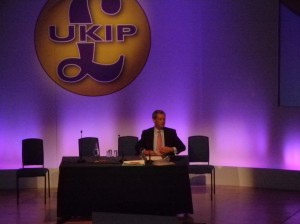 From a Guardian interview with Nigel Farage, the leader of Britain’s neo-Thatcherite, euroskeptic UKIP:
From a Guardian interview with Nigel Farage, the leader of Britain’s neo-Thatcherite, euroskeptic UKIP:
He won a lot of Tory support by opposing gay marriage, chiefly because it was an affront to religious values. “Tolerance is a two-way street, and the whole equality rights agenda has come to the point of head-on conflict with religious faith,” he declares, as if such a conflict must de facto discredit the equality agenda. It takes some nerve to oppose gay marriage on religious grounds – while adding, “I know the Anglican church isn’t much good, but mind you, with that idiot having run the show for the last 10 years that’s hardly surprising. Couldn’t even clip his beard for the royal wedding!” – when, on closer questioning, it transpires Farage isn’t even really a Christian. He claims never to have thought about whether he will go to heaven, or even if such a place exists. “Never.” He goes to church four or five times a year, and thinks it plays “an important role in our society”, but as for believing in God, “I think there is something there, but that’s as far as it goes.” It sounds to me as if he’s agnostic. “Well you’ll have to draw your own conclusion,” he says, looking slightly embarrassed.
While I don’t agree with Farage on same sex marriage (live and let live, say I), the rest of this section of the interview is worth noting for the (presumably leftish) interviewer’s failure to understand that it’s quite possible to oppose something as being an affront to religious faith without sharing that particular set of beliefs. Farage quite clearly sees the Church of England (however flawed) as part of the tradition that makes the country what it is, an essential element in the glue that holds it together. Whether the rather wild claims on which it was originally based—first made in some foreign country two thousand years ago—were true is, of course, an irrelevance.
